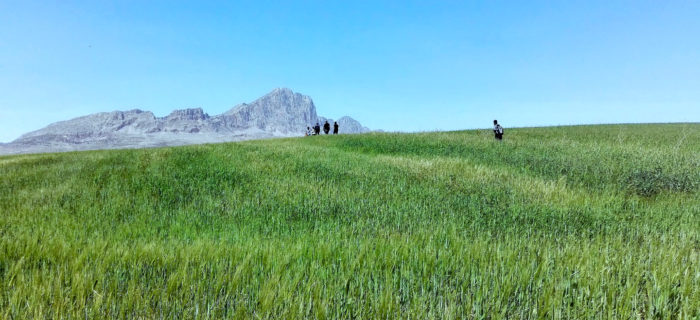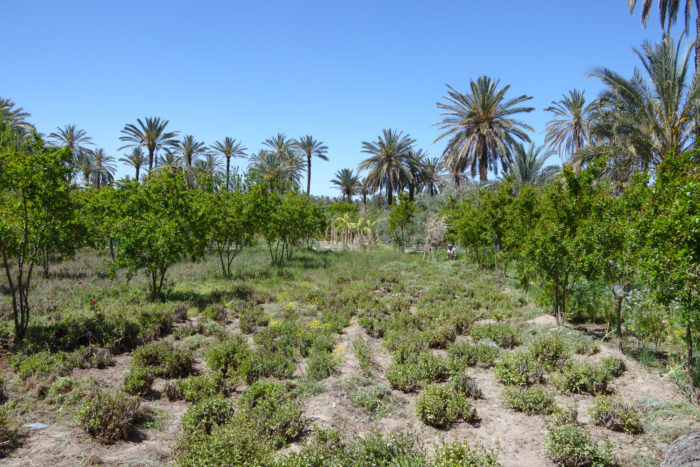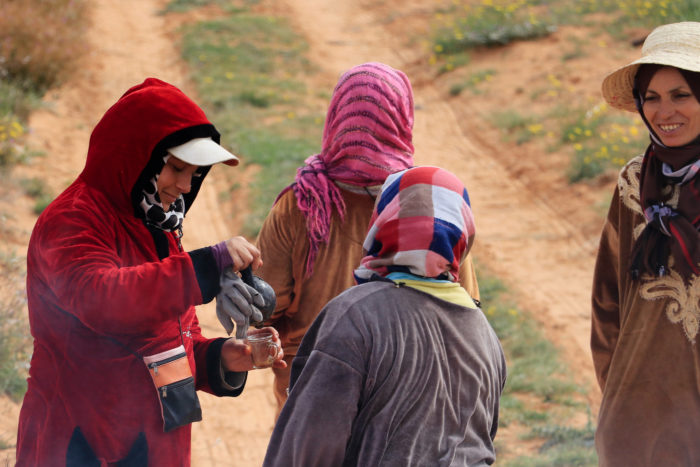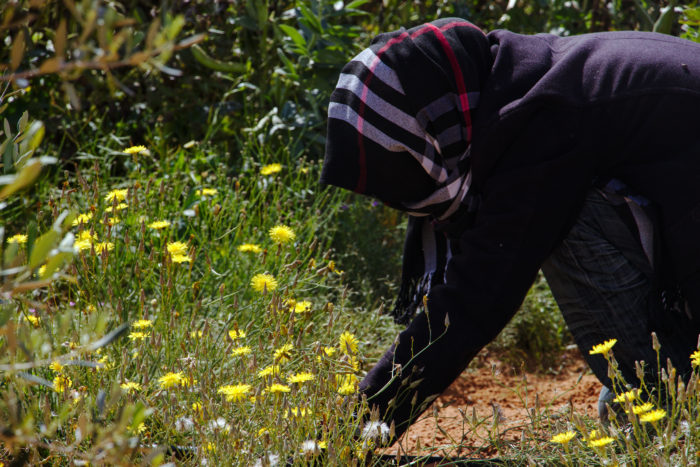Building Food Sovereignty in Tunisia
The Tunisian government is in high-level talks to remove the last crumbling barriers protecting Tunisian agriculture. Efforts to capitalize on the ‘comparative advantage’ of Tunisia’s nearly year-round sunshine has already forced a shift toward production of fruit and vegetables for export, and increasing dependence on imports for the basic cereals that make up most Tunisian diets. As the nation’s agriculture turned to meet the demands of Europe over the last 25 years, poverty in the countryside swelled. If the changes go through, it would cement dependence on the European trading system, and decimate what is left of Tunisia’s diverse peasant agriculture.
Dr. Habib Ayeb, activist, geographer and co-founder of the Tunisian NGO Observatory of Food Sovereignty and Environment (OSAE) discusses the potential changes and presents a new vision for food sovereignty in North Africa in this opinion editorial.
Translation and introduction by Max Ajl.
Leaving ALECA and the Global Food System: For a New Sovereign Agricultural and Food Policy that Breaks Definitively with Food Dependence and International Markets
One out of every two Tunisians is currently fed from outside the country. Our food dependence now exceeds fifty-five percent of our consumption. This situation was not inevitable. Contrary to what the vast majority of experts and decision-makers say (against all evidence), Tunisia has sufficient natural resources, including water and land, as well as human resources, namely extremely rich peasant knowledge, to feed its entire current population, if not a larger one.
For decades, Tunisia has been sinking into an ever-more-asphyxiating food dependency. After 2011, many of us wished for a change of course and hoped for a complete break with the policies that had been followed since national independence. However, all our governments have blindly pursued the policies of their predecessors in a forced march to nowhere, and against the vital interests of the country.
This massive food dependency is likely to worsen if the Deep and Comprehensive Free Trade Agreement (ALECA, as it is commonly known by its French acronym) with Europe is signed and approved by Tunisian policymakers. Our agricultural and food market would be fully open to European producers and distributors, while our own agricultural and food products’ access to the European market would remain subject to draconian customs barriers. At best, we will continue to suffer the consequences of comparative “disadvantage,” and with no ability to respond. Thus, we would continue to export fruits and olive oil, grown thanks to our generous sunshine, exploit our local natural resources, and maintain a low-wage policy and unjust, unequal land distribution. We would continue to massively import cereals, the basis of the Tunisian food-basket.
Stay in the loop with Food First!
Get our independent analysis, research, and other publications you care about to your inbox for free!
Sign up today!If, however, our political choices stop corresponding to the preferences of our Western “friends” or those of the International Financial Institutions (IFIs), we would have only our fingers to eat. The recent geopolitical events in the Arab world – from Iraq, to Syria, Sudan, Libya, and Yemen – prove, irrefutably and indisputably, that a trade embargo, including on food, can be decided and implemented in only a few days. The social and political consequences, and the implications for food security, would be absolutely terrible for all Tunisian citizens.
The current negotiations around ALECA are glaring proof of our food dependence. Some people (myself among them), are pushing the negotiators and the government to reject these agreements. It is a political position, based on our principles, which I will continue to defend. But are we aware that such a radical choice would cost us dearly? If signing the ALECA agreements worsens our food-import dependence, not signing it could also produce a social, economic, and political nightmare. Faced with a refusal of the ALECA agreements, Europe and the global food market have their own retaliatory measures – which could reach the total closure of international markets to Tunisian products. There would be billions of dollars in losses, plunging us into an economic crisis of a scale we have never known.
This is obviously contradictory. To simply sign the ALECA would be a shameful submission. Not to sign would be a considerable risk—if such a decision were not immediately accompanied by immediately adopting a new food and agriculture policy, breaking definitively with the current one. Such a shift must break with the principle of “comparative advantage” and replace that one with its own first principle, one simple to formulate and easy to apply: “Natural resources, including land and water, must first feed our own population.”
The paradigm shift becomes urgent
Far from wanting to return to the 1960s-era cooperative policy, this change in agricultural and food policies requires two bold and pro-active political decisions: 1) Remove the agricultural sector from the sphere of capitalist and speculative investments, which only seek financial benefit; 2) Put the peasants, who are now stigmatized, disadvantaged, and marginalized, at the heart of Tunisian agriculture. They need it, and the whole country needs them. This is not a question of placing them under stewardship, nor giving them alms, as if they were a charity case. Instead, it is about making them the keepers of the keys in the agricultural sector, and restoring to them, the elemental functions of feeding people and protecting our natural resources and our environment. It is a question of giving them back the dignity of which they have been dispossessed.
Today, three percent of agricultural producers have more than 100 hectares each. They hold more than 30 percent of arable land and produce largely for foreign markets. At the same time, 97 percent of farmers hold less than 100 hectares each, and occupy the remaining two-thirds of the agricultural land. For the most part, these farmers produce for local and/or national markets. It should also be noted that 75 percent of Tunisian farmers own less than 10 hectares. They occupy just 25 percent of the total agricultural land and produce almost exclusively for the local and national markets. These figures alone account for a large part of the country’s food dependence, since much of the agricultural land is producing mainly for foreign markets.
Only a willful agrarian reform can correct these unjust and punishing disparities.
This must be addressed through a radical agrarian reform that sets minimum and maximum thresholds for agricultural property, regulates the land, agriculture, and food markets, uses tax policies to prohibit speculative investments in food and agriculture, and shifts agricultural production to local and national markets at the expense of export to international markets.
In an economically dependent country such as ours, the agricultural sector is economically and politically strategic. It must be cherished and protected. All northern countries secure their agricultural sectors and protect their own agricultural market with formidable if not insurmountable customs barriers. Few countries in the world subsidize their farmers as much as the United States and Europe do. Let us remember that the Treaty of Rome, signed on March 25, 1957 in Rome between West Germany, Belgium, France, Italy, Luxembourg and the Netherlands, sought the creation of a “European economic market.” It was born of the awareness of European heads of state of the need to secure their agricultural sectors in the face of foreign, and especially American, pressures.
Today, agricultural policies in Tunisia do the opposite: they rip down any protective bulwarks around the Tunisian agricultural sector. This is criminal and irresponsible blindness, and a major threat to current and future generations.
It does not escape me that the catastrophic cooperative experience of the 1960s, which bore within it the intrinsic reasons for its failure – even without the political challenges that accelerated the fall of its promoter, Ahmed Ben Salah – has made the idea of agrarian reform unthinkable for most of the country’s population, as well as the political and economic elites. However, before we reject agrarian reforms out of hand, two other experiences deserve attention.
The first is the agrarian reform that the United States imposed on South Korea in the aftermath of the Korean War. In lieu of Korea’s reliance on Western food aid, its main objective was to make Korea self-sufficient in food. It was an unquestionable success, and contributed to the Korean “miracle” we know today. Marx was in no way responsible for this experiment, which was led by the world’s major capitalist power in a country which at war’s end launched itself full bore onto a liberal and capitalist trajectory. Tunisian liberals who take offense and are frightened by the term “agrarian reform,” ought to read more about the history of capitalism and the ideology with which they identify.
The second experience is the indispensable experiment in Cuba. In the wake of the Castroite revolution, Cuba was subjected to a draconian trade and food embargo at the hands of its hulking North American neighbor. Cuba put in place, particularly since the early 1990s, a food sovereignty policy based on three basic elements. First, a reform of land and agrarian structures based on a simple principle: the land to those who work it, to feed themselves and the rest of the population. This choice saved the country from famine and drastically reduced foreign food dependency. This reduced the risk of political pressure, be it from its enemies or its friends. Second, pesticide use was drastically constrained, with a twofold objective: to strengthen Cuba’s independence from the global market for agricultural chemicals, and to avoid the effects of such toxic products on the health of producers and consumers. The world knows well the undeniable success of the Cuban health system, which is at the top of global rankings for life expectancy at birth. And third, the systematic use of agroecology to protect agricultural soils against exhaustion and sterilization caused by monocultures. All available studies and research show that, thanks to these reforms, Cuban agriculture has become more productive than it was with conventional, productivist models. Today, Cuba is recognized as a model of food sovereignty. And even better, thanks to the direct and indirect help of Cuba, several African countries have been able to avoid famines that the Western powers could not have avoided or palliated.
Of course, Tunisia is neither South Korea nor Cuba. The geopolitical context is incomparable. It is therefore not a question of importing these two experiences, but of taking political inspiration, and extracting some positive elements to imagine local solutions that take into account Tunisa’s geographical, agricultural, ecological, social, economic and political context. It is a question of building the country’s food sovereignty and reorienting our agricultural and food policies towards more food independence, more social and environmental justice, and less ecological, economic, and political risk.
A developed agricultural sector, free from speculative investments and oriented towards food sovereignty and the right of current and future generations to a sufficient, balanced, healthy farm sector that protects the environment, is a sector which would guarantee real food security for producers as well as consumers. It would protect natural resources and biodiversity and attract young people, today ruined by the lack of jobs and opportunities and so often driven to extreme and often suicidal solutions. Food sovereignty creates an organic link between producers and consumers, and integrates them into a model that protects the interests of both.
This is what current policy makers reject without even discussion or debate. Our duty is to bring them to accept such a debate, including political argument and political confrontation. This ought to be based on analyses of the processes now underway in the agricultural sector.
We demand more food independence and a basic respect for food and feeding. This is urgent and indispensable if we want to reduce rural and urban social marginality, provide opportunities for the younger generations, protect our environment, protect ourselves from the catastrophic consequences of climate change, reduce our exposure to foreign pressures, and leave a better Tunisia for future generations.
The exit from ALECA and more generally from the world food market is an absolute emergency. But to leave without radically reforming our agricultural policies would be like jumping from an airplane without a parachute.
We can indeed move towards real food sovereignty – a model which ought not to be reduced to any kind of chauvinism, or blind and suicidal nationalism. To seal shut doors and windows is to condemn oneself to die of suffocation. To open them completely is to risk being swept away by gales.
We demand a radical change in our agricultural and food policies for greater individual and collective sovereignty, more dignity, more security and more social, economic, environmental, regional and intergenerational justice. We can, and we must do it.
Habib Ayeb is a professor of geography at Université Paris 8, film-maker, and founder of the Tunisian Observatory for Food Sovereignty and the Environment. A French version of this article can be found here.
Max Ajl is a graduate student at Cornell.
Photo credits: Ernest Riva






 Help Food First to continue growing an informed, transformative, and flourishing food movement.
Help Food First to continue growing an informed, transformative, and flourishing food movement.




